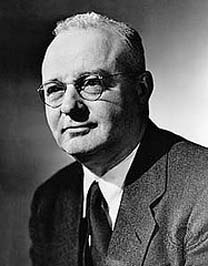Thomas Midgley, Jr.: Developed Tetraethyl Lead for Gasoline
Lessons Learned: Looking Back to Go Forward
A series of articles exploring historical events that provide an important lesson for ensuring a more sustainable and healthy environment. Originally published as a bulletin feature for the newsletter of CHE-WA (Collaborative on Health and the Environment, Washington State chapter); produced by Steven G. Gilbert.
 Thomas Midgley, Jr. (May 18, 1889 - November 2, 1944), an American chemist, developed the tetraethyl lead (TEL) additive for gasoline and chlorofluorocarbons (CFCs) and held over a hundred patents. While lauded for his discoveries during his time, today his legacy is seen as far more mixed considering the serious negative environmental impacts of these innovations. One historian remarked that Midgley "had more impact on the atmosphere than any other single organism in Earth's history."
Thomas Midgley, Jr. (May 18, 1889 - November 2, 1944), an American chemist, developed the tetraethyl lead (TEL) additive for gasoline and chlorofluorocarbons (CFCs) and held over a hundred patents. While lauded for his discoveries during his time, today his legacy is seen as far more mixed considering the serious negative environmental impacts of these innovations. One historian remarked that Midgley "had more impact on the atmosphere than any other single organism in Earth's history."
Midgley tried hundreds of compounds to control engine knock. On December 9, 1921, a chemist delivered a small amount of tetraethyl lead, or TEL, and when Midgley added the TEL to the fuel and started the one-cylinder test engine, the engine knock was gone. GM and Standard Oil of New Jersey (forerunner of Exxon) formed the Ethyl Corporation shortly thereafter to produce TEL. The company's name was carefully chosen to avoid the use of the word "lead," but safeguards at the factory weren't as effective. Not long after it opened, workers at the Ethyl plant began suffering from lead poisoning. Two workers died from exposure to what the press called "loony gas." Midgley himself suffered from lead poisoning and took a vacation to "get a large supply of fresh air." Ironically, Midgley would later develop freon, a refrigerant that cooled indoor air for nearly half a century.
In 1922, the US Public Health Service warned of the dangers of lead production and leaded fuel. However, these precautionary warnings went unheeded, and the primary phase-out of leaded gasoline in the US was not completed until 1984. The World Bank called for a ban on leaded gasoline in 1996 and the European Union banned leaded gasoline in 2000. It is estimated that 7 million tons of lead were released into the atmosphere from gasoline in the United States alone.


